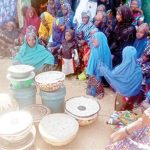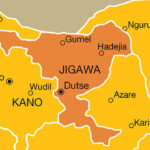Jigawa is one of the northwest states ravaged by floods.
The flooding has gone beyond prediction, causing loss of lives, houses and farmlands, and posing threats to agricultural activities this year.
The state governor, Alhaji Muhammad Badaru Abubakar, in an interview with reporters in his office recently discussed what they have been doing to address the menace.
What is the extent of the damage that flooding has caused in Jigawa State this year?
First of all, I want to sympathise with my people, the people of Jigawa State for this unfortunate incidence and condole the families of those that have died.
To put a number to the people who have died is difficult because this thing keeps increasing.
At the last count, we had about 20-25 lives lost.
If it is one life that is lost as a result of flooding, it is really serious.
So we will do our best as a state to see what support we can render to these families and to see how to support the entire people of Jigawa State.
The flooding has affected too many towns and villages for me to visit, but our team has been visiting these towns and I hope they will get to each town and sympathise with the people on my behalf and see what help they need.
The assessment is on the way now.
A committee set up by the government had made recommendations on how to tackle perennial flooding in the state. What is the state government doing to implement the committee’s recommendations instead of relying on emergency provisions?
First, I want to thank President Muhammadu Buhari for the trimming project for the Hadejia Valley that has helped a lot to reduce flooding.
As you are aware, our team has been deployed there and are busy trying to analyse how flooding occurs and, in the last five months, we have been putting embankments in the areas where flooding occurs.
And this year, we have experienced less flooding in those areas where we have provided the mitigations.
Most of the flooding this year were in places we did not envisage and we will also analyse that because there is heavy downpour and when you analyse this with the number of houses that have gone, more than
51,000 houses have so far gone, and we are still expecting more to go down because recent rains come with full force and some of the houses cannot withstand the velocity, so they keep going down.
However, in some cases, it is not flooding, but heavy downpour that destroyed mud houses, and that has been the trend this year.
I think even our estimate of 51,000 houses is based on the towns that we have been to, I’m sure by the time they round up the state-wide fact-finding mission, we will know the exact number.
I know it is in most of these houses that the 21 people died.
There are about four or five who died as a result of drowning in rivers. Therefore, it is tragic and we are putting many mitigation strategies in place to checkmate it.
What we have seen this year is not the traditional flooding that we use to know.
We are still praying and hoping that Hadejia Valley will still be intact until the end of the rainy season.
A lot of embankments have been built around the Valley.
We have been busy with this for more than five months, building embankments across the state.
Is the state accessing the ecological funds from the federal government, if yes, how much has the state received so far?
We are working on it and they are doing the intervention.
It is not yet accessed, but I’m sure we are on the first row to get support from the ecological fund.
Certainly, they are very busy to see how they can support Jigawa State.
They have done some projects directly from the ecological funds around the state in the last four-five years that I know, but we are busy trying to get comprehensive support, most especially in Dutse and environs to mitigate the menace of erosion.
There are some communities, according the report, that can only be saved by relocating them. How many of such communities are you planning to relocate?
I know that there is one in Ringim Local Government, where preparation has been on top gear and some people have started relocating.
In addition, we are busy trying to analyse wherever danger is imminent, we will relocate them and push them to a higher ground and that will do.
Will the flooding threaten mass production of food this year?
We are still looking at the survey.
What I know is that farming activities have increased heavily this year in the state.
That was why our estimate on the sales of fertilizer has skyrocketed that we have to buy extra fertilizer to service the people because of the tremendous increase in farming activity in the state.
So, my team is assessing the damages to farmlands and that is when we will know exactly what will happen during the harvest, whether we still have increased food production or reduced production.
There are two things, production increases because of additional farming and involvement of additional farmers and now flooding impacts on these activities.
We have to look at the ratio and calculate but I think the food production will increase significantly, but of course, some farmers will lose their harvests and we are working with the ministry of agriculture in the state and will give them the early maturing variety so that they can do residual moisture farming immediately after the water recedes.
That we have done in the last two years and it has proved effective and has helped the farmers to make some money and grow some food for themselves.
We are also planning the same thing this time around.
So if we know such lands, we will still plant those early maturing plant variety so that the farmers will catch up with the production.
We learnt that the state government purchased canoes and other essential items for victims of the flood, may we know how much the state government has spent in acquiring those items?
You always like to know how much has been spent.
As a chief executive, they keep coming and going with requests.
For instance, the flooding is a day-to-day activity.
Every day, you sign out something to mitigate flood or the other, so I will not be able to address the question effectively and honestly.
If you visit our website, they are there, we are not hiding.
Every expenditure we have made is on our website.

 Join Daily Trust WhatsApp Community For Quick Access To News and Happenings Around You.
Join Daily Trust WhatsApp Community For Quick Access To News and Happenings Around You.


